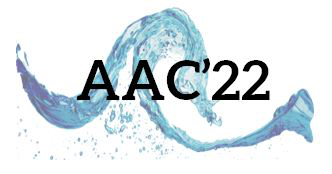Speaker
Description
The energy required to drive a large-amplitude plasma wave can be delivered over many plasma periods, rather than in a single period, if the driving pulse is modulated. This approach opens up plasma accelerators to novel laser technologies which can provide the required energy at high pulse repetition rates, and with high wall-plug efficiency. We recently proposed [PRL 127, 184801 (2021)] that the required modulation can be achieved in a two-step process: (i) spectral modulation of the long drive pulse by co-propagation with a low-amplitude plasma wave driven by a short, low-energy seed pulse; (ii) conversion of the spectral modulation to temporal modulation by a dispersive optical system to generate a train of short pulses suitable for resonantly driving a plasma accelerator. We demonstrate the physics of this Plasma-Modulated Plasma Accelerator (P-MoPA) with numerical simulations, and show that the spectral modulation is well described by a 1D analytic model. We find that existing, efficient thin-disk lasers could be used to accelerate electrons to GeV level energies at kHz-repetition-rate. For example, particle-in-cell show that the pulse 1.7 J, 1 ps drive pulse, modulated by a 140 mJ, 40 fs seed pulse in a 120 mm long plasma channel, can generate a pulse train capable of accelerating electrons to an energy of 0.65 GeV in a 100 mm long accelerator stage.
Acknowledgments
STFC UK, EPSRC UK, AFOSR USA, EU Horizon 2020, UKRI, ARCHER and ARCHER2 PR17125 UK supercomputers and STFC SCARF cluster.

